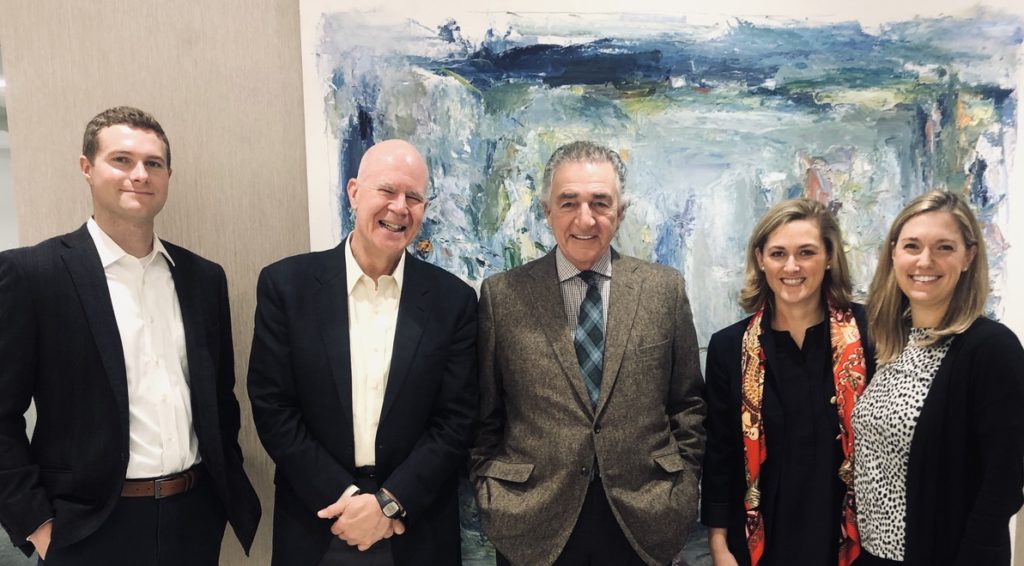
Bio

Thomas S. Bozzuto has dedicated his career to creating sanctuary. As a man of both reflection and action, his business model has been governed by civic responsibility and the belief that true success comes to those who do things the right way.
Founded On Values
In the mid-1970s, Tom met his fellow founders of The Bozzuto Group—Rick Mostyn, John Slidell and the late Bernie Lubcher—working at Oxford Development Corporation. When they formed the company in 1988, they agreed their firm would be different from that of their peer group. They decided to focus on using the power of relationships and the company’s newly established core values to guide them in creating communities that residents would be proud to call home.
Bozzuto has since been a leader in revolutionizing the multifamily industry by focusing first on its customers’ needs. By delivering on our promises, developing and building vibrant communities and providing exceptional service, we have purposefully grown and continue to challenge ourselves to get better with each new development.
Built On Integrity
Tom’s ability to build enduring partnerships is a testament to his ethics and business acumen. He has always understood the importance of listening to and respecting one’s business partners and customers. As a result, Bozzuto has a long track record of successful and repeated partnerships. These range from entrepreneurs and land developers to institutional investors and financial institutions to community-based non-profit groups. Tom has always known the company’s reputation and its brand are one in the same.
Under Tom’s Leadership
Tom strongly believes that embracing diversity in the workplace inspires creativity and innovation. He says, “By bringing different viewpoints together, we solve problems and create solutions that inevitably attract employees and create extraordinary experiences for our residents.” This mindset extends to our customers and partners as we find unique and creative ways to put their needs first.
Bozzuto’s customer-focused approach is evident in every project and has brought the company tremendous recognition over the years, including Builder of the Year, Multifamily Development Firm of the Year and Property Management Company of the Year by the National Association of Home Builders. Among many other awards, the firm has been repeatedly honored for its company culture. It’s received recognition seven times by the Washington Business Journal, three times by the Washington Post and earned a Top Ten Company in the country ranking by Multifamily Executive Magazine.
A Senatorial Appointee to the Millennial Housing Commission and multiple appointments to the Governor’s Housing Commission, Tom has earned numerous awards and recognition for his professional achievements, including the Urban Land Institute’s Lifetime Achievement Award.
In 2015, Tom transitioned the role of President and CEO to his son, Toby, and assumed the role of Chairman of The Bozzuto Group. He remains actively involved in the company and serves as a leader in the multifamily industry. Above all, the values and vision he established over 30 years ago set a strong foundation, forever guiding the company towards continued success.
Concern for the Community
As an entrepreneur, philanthropist and veteran, Tom has had a long career of community involvement and leadership. Whether it’s his active involvement with national housing policy, committed support of the arts or dedication to higher education, Tom has made it his mission to be driven by the greater good.

Chairman National Multi-Housing Council

Chairman Board of Trustees at Hobart & William Smith Colleges

President Baltimore Citizens’ Planning and Housing Association
Celebrating Culture
“Nothing—not strategy, not tactics and not even capital—is more important than culture.” —Tom Bozzuto From hosting lunches to visiting communities and construction sites, as Chief Culture Officer, Tom strives to personally connect with and inspire the many talented people who work at Bozzuto. They are the eyes, ears and heart of our company.
Passion
One of Bozzuto’s core values is passion. Outside of work and his family, Tom is an avid reader and writer. After collecting “rules” for living, Tom put together his first book Reflections of an Ordinary Man and shared it with employees, partners and friends for the company’s 30th anniversary.
Show Notes

From Left: Justin Kennell, John Coe, Tom Bozzuto, Blanton Smith and Caroline Sullivan
For Episode #9, I am honored to present Tom Bozzuto, not only a local, but national icon in the multifamily development, operating and management business. I also invited 14 ULI Young Leaders to join Tom and me as an audience for the interview. Tom and I have a dialogue first and a few audience members ask subsequent questions.
I met Tom shortly after he broke away from Oxford Development and formed the Bozzuto Group in 1988. Even though they were a small company at the time with three partners including John Slidell, Rick Mostyn and him, I could sense they had a strong direction and quality business plan with momentum building. Before forming his company, Tom began his career at HUD in Baltimore and quickly realized that the public sector was too slow for him and he joined the James W. Rouse Company (now Columbia National) as a mortgage banker. This experience taught him real estate valuation and leverage, as well as the importance of relationships in the business. After a couple years there, he returned to his home area of New England to work for Oxford Development Company in apartment development to achieve his life long passion of providing housing. Oxford closed the office in Boston and he subsequently moved back to the DC area where they were headquartered. The 1986 Tax law effectively changed the nature of real estate investments which had a devastating impact on Oxford, such that Tom, because of a relationship with New England Life he developed as a mortgage banker, decided to start his own company.
Today, the Bozzuto Group has over 2,500 employees, manages over 80,000 residential units, developed over 45,000 homes and apartments, and has annual construction revenue of over $500MM. Tom talks about the company’s core values, which are Concern, Creativity, Passion and Perfection.
One thing that Tom does not talk about in much detail is his recent book, Reflections of an Ordinary Man. This book “reflects” with 85 quotations by him and other literary luminaries interspersed with prose/poetry he wrote over his lifetime in a compendium organized to use as a reference for wisdom. While he expresses much of his philosophy in our discussion, this book fully explains in simple aphoristic manner, his life lessons and advice. It is a classic not only for real estate professionals, but for everyone.
Here are the highlights of our discussion:
Current Activities
- “The only thing more gratifying than having my son succeeding me is if he does it better than I did and Toby is doing a great job” (4:10)
- Tom now has a separate office in Baltimore as “Chief Cultural Officer” and still comes in weekly to Management Meetings discussing new business (4:40)
Background & Career Trajectory
- His Dad worked in a factory making bullets during WW2 and worked from 11pm to 7am then drive an oil truck until 11am. (6:50)
- Tom and his wife moved to Baltimore in 1971 with $370 to their names (8:04)
- HS Football Captain (8:40)
- Hobart College– Initially a troublemaker or on academic probation; however, a faculty member gave him a compliment that took him back (laying on of hands): “I was the toughest minded son of a bitch he’d ever met” (9:00)
- Involved in student government at Hobart in 1968 and led the students in demonstrating against the university administration (10:20)
- Due to the race riots in the country at the time, Tom decided he wanted to “save the cities” in public administration and applied and was accepted to Syracuse Public Administration Masters degree (12:20)
- Fellowship to Calcutta India was offered to him, except he was drafted into the Army in 1968 and went to Vietnam while in graduate school where he returned after one year as an enlisted man (14:10)
- Became a combat correspondent in Vietnam even after lying about being a journalism major (16:30)
- Went to work for HUD in Baltimore in 1971 (17:00)
- Looked at himself as a “houser,” not a real estate person (18:30)
- HUD formed in 1960s with progressive minded young people and was merged with FHA, a staid Federal agency and it was a cultural misfit between them (18:55)
- Investigated by the FBI while at HUD and was told that they couldn’t find anyone that worked as hard as him unless they were crooked” (19:50)
- Decided to leave HUD to join Jim Rouse at the James W. Rouse Company- mortgage banking, but not housing…wanted to learn about real estate and leverage…great learning experience (21:00)
- Relationships were the most important thing– Insurance Company relationships- CIGNA is his longest standing relationship (22:30)
- Story about my meeting Tom and why we didn’t ever complete a deal (24:00)
- How did the development bug hit?
- Tom & his wife wanted to move back to NE and moved to Boston (25:50)
- Felt he didn’t have an “impact” as a mortgage banker (26:15)
- Oxford hired him in Boston to join them; however, he commuted to DC every week due to his relationships (27:00)
- Closed Boston office and he moved back to DC area (27:30)
- Story about political graft expected on obtaining approvals (27:50)
- Story about winning approval on a project in Boston and then losing due to a lawsuit about a snowstorm that prevented people from attending and presenting their concerns (28:20)
- 1986 Tax Law impact on Real Estate
- Discusses tax law impact (31:00)
- Tremendous overbuilding and there were over 700,000-800,000 apts. Annually in the mid 1980s (32:15)
- Oxford’s business model was almost all tax oriented and highly leveraged. (33:00)
- Tom began JVs with Oxford- Copley and CIGNA (33:50)
- Paycheck reduced 60% one day the banks forced renegotiation of credit line and he was given the East Coast operation of Oxford (34:15)
Origins and Growth of Bozzuto Group
- In 1987 Tom offered to buy his regional operation from Oxford and he had a site in Gaithersburg to develop and New England Mutual (Copley) agreed to fund it subject to making Tom the General Partner and not the Oxford principals, which forced the sale of the operation that formed the Bozzuto Group (36:00)
- Never worked as hard from January-April, 1988 in forming the company- Brought in Rick Mostyn, his compatriot in his operation and John Slidell and Bernie Lubshur as development partners (38:40)
- Negotiated exclusive relationship with Copley for development in the region as partners and then Rick Mostyn negotiated a $2MM line of credit with Maryland National on full recourse. (40:15)
- “Imagine going home and telling your wife you needed to sign on a #2MM note together with me”(42:00)
- Seven Projects under construction when the company started that came with the acquisition of the Oxford regional operation (42:30)
- Working capital from a Baltimore entrepreneurial capital company (Broventure) that invested at the project level (43:50)
- Original plan was to build and manage their own projects. (46:15)
- In 1992, some of Bozzuto’s institutional relationships asked them to consider managing properties for them and a non-profit asked them to build a project for them (47:30)
- Evolution of company’s personnel- Julie Smith, Toby Bozzuto, & Mike Schlegel are the company leaders (50:45)
- Recession discussion- In 1991-92, company was so small that it wasn’t as impacted as others (52:15)
- Tom cites stories about opportunities that arose from the 1991 recession including the condominium business (54:20)
- More recent recession in 2008-9 was even more challenging (57:50)
- Criteria for development has expanded considerably into urban mixed use projects (58:00)
- Avoid doing only one type of development (1:00:00)
- Costs of development has made affordable housing is almost impossible to move forward (1:00:30)
- Complains about regulation which adds considerable cost to projects (1:01:00)
- Competition for land together with regulations causes hypocrisy (1:01:30)
- Geographical expansion driven by the management company and from JVs with local partners in other markets. Chicago, Boston, Philadelphia, Miami (1:02:25)
- Analysis of customer- Characteristics running across demographic profile–people that enjoy experiences and value education (1:05:55)
- People who will pay a little more to get more service (1:07:00)
- Rigorous process to review projects (1:08:20)
- Market analysis, manager, architect to decide who will live at this property (1:08:50)
- His job to teach people to be tough minded (1:10:05)
- Establish guidelines and rules- be a “devil’s advocate” (1:11:00)
Trends in Multifamily Development
- Sophistication in apartment development business much better. Most apartment builders were part of home building business in the 1970s (1:12:30)
- Texas developers brought professional management to the apartment business (1:14:00)
- Commercial developers now in apartment development
- In 2001 the shift of apartment sector to be predominant over commercial property (1:15:00)
- Correction will cause a slowdown that will shake out both operators and investors that should not be in the business (1:16:50)
- Try and posture your company to look at opportunities to look at short term rentals/hotel operations and other opportunities (1:18:00)
Company Culture
- Building “sanctuary” to make a resident feel like home (1:19:40)
- “Easier to hire a nice person and teach skills that to hire a skilled person to teach him to be nice” (1:20:15)
- Build company with unique culture in early years (1:21:00)
- Values- Concern, Creativity, Passion and Perfection (1:22:00)
- Concern for each other and for clients
- Creativity– bring ideas and share them
- Passion– Really want to come to work
- Perfection– May not be achievable, but Da Vinci and Michaelangelo came close
Personal Philosophy and Current Civic Commitments
- Balance of family, work and the community (1:23:30)
- Family is the beginning and the end of everything (1:24:20)
- “I lived to work”- conversation with wife that he would not be home at night during the week (1:24:30)
- “Business is about showing up” (1:25:00)
- Technology allows today’s employees to work at home (1:25:50)
- Chairing Hobart/William Smith Colleges board and had to oversee succession of new President (1:27:10)
- Chair Elect of the Greater Baltimore Civic Association (1:27:50)
- Greek leadership- “Idiotus”- a person who did not take part in community life at all. A Lesson to all. (1:28:10)
Final Words
- Career planning- “If you do your current job better than anyone else, you will be offered many opportunities to achieve” (1:29:30)
- Biggest failure- Opportunity to sell homebuilding business in 2006. Violated a cardinal rule –never count the other guy’s money. Decided not to sell and now regrets it. (1:30:30)
- Forming the company was his biggest success and built over 50,000 homes and a multi-generational company that created careers for thousands of people (1:32:30)
- Advice to his 25 year old self: “Go for it!” (1:33:40)
- Story about Toby’s interest in joining the company (1:33:50)
Questions from Audience
- Question from Dylan Bennett, JBG Smith- “Could a young entrepreneur today get started like you did to start his/her own company?” Yes, however, the stakes are much higher today. So much change allowing for new opportunities. Story about Martin Ditto (1:38:30)
- Question from Connor Burke, Federal Realty- “When approaching a project from the ownership or management or for sale or rental?” Apt. sites need to be bigger than “for sale” sites. Apts. need to be at least 200 units. How do we decide between institutional and F&F deals? Balance portfolio between F&F and institutional (2 to 1- institutional over F&F). (1:41:00)
- Question from Michael Zhang, FCP – How does Bozzuto address property management competition? The business hasn’t changed much, yet Bozzuto knows its business better now. Tom visits a third of his properties under management every 6 months. There are several great developers; however, not many great property managers. Bozzuto made it a priority. (1:44:00)

